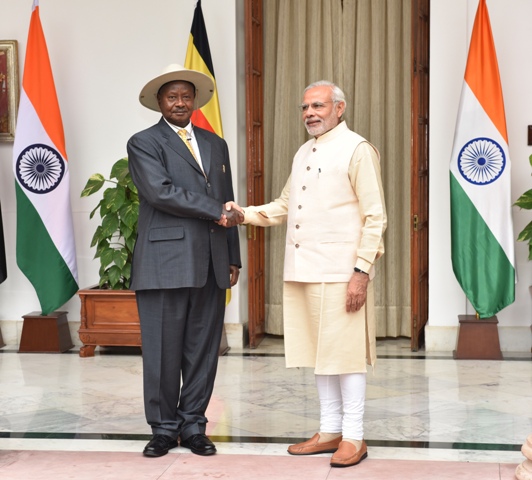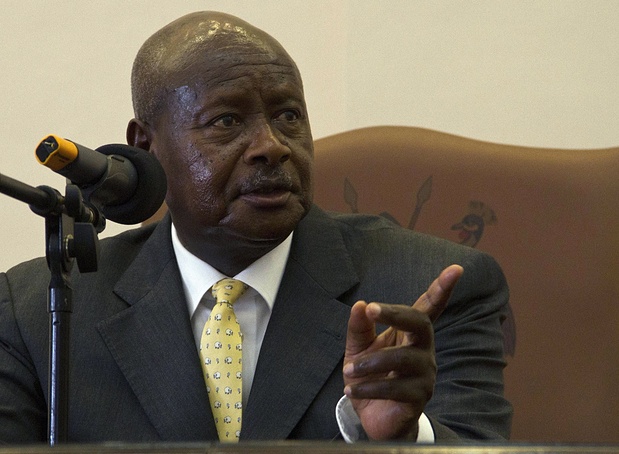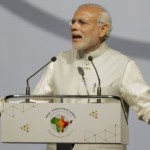
October 29, 2015
Rt. Honourable Modi, Prime Minister of India,
H.E. Robert Mugabe, Chairperson of the African Union,
Her Excellency Nkosazana Zuma, Chairperson of the African Union Commission,
Your Majesties,
Your Excellences’ Heads of State and Government,
As I told Your Excellency yesterday, the overriding universal legitimate interest of the whole human race should be “prosperity for all.” This is actually a concept we use in Uganda. Even globally, this concept is legitimate. The most efficient way to generate prosperity is to support one another through trade, investments, tourism and sharing science knowledge. This is the smart way of moving “towards a dynamic and transformative agenda,” as our theme for this forum goes. As I told Your Excellency, when I buy what you produce, I am supporting your prosperity and vice-versa.
The current figures show that Uganda supports India’s prosperity by buying US$1.6 billion worth of goods. India, on the other hand, only buys goods worth US$16million.
This is unbalanced support for each other. We need to work together systematically so as to expand and balance this trade. India should support Uganda and Africa to develop infrastructure so as to lower the costs of doing business in Uganda, thereby attracting more businesses into the country. India should work deliberately to open their markets to goods from Uganda and Africa. If you look at the figures of trade, you will see that Africa, certainly Uganda, has been supporting the prosperity of India by spending US$1.6 billion per annum importing products from India.
The majority of these imports have been oil products, probably re-exported (US$533 million) and pharmaceuticals (US$117 million). Uganda, on the other hand, only exports to India goods worth US$16 million mainly coffee beans. This means that Uganda has been supporting the prosperity of India more than India has been supporting the prosperity of Uganda. This imbalance, in mutual prosperity support, needs to be corrected. I have made concrete and specific proposals to the Indian side to correct this.
Even the similarity of products, e.g. tea or textiles, should not be a problem. India could allow Uganda’s processed tea and textiles so that the Indian consumers are the ones that decide on what they prefer.
Although Africa is 12 times bigger than India, the populations of the two areas are almost equal today. Africa’s population is 1.23 billion. In the past, the Indian population has been much bigger than that of Africa. By 2050, however, the African population will be 2.5 billion people while that of India will be 1.66 billion. These two areas – the continent of Africa and the sub-continent of India – should deliberately use these huge population groups in the two areas to support, through trade, the prosperity of the two peoples – the Indians and the Africans. Put another way, the two key players of the modern world are the consumer and the producer of goods or services. It is these two that generate prosperity. All the other actors are linkmen. Let us link our producers and consumers in a balanced way.
Apart from trade, we can support our prosperity mutually through four other areas – investments, tourism, scientific knowledge and co-operation on the issue of global security (either bilaterally or through the UN). I am told 15 million Indians go out as tourists per annum. I normally see some in London when I pass through there. Some of these could come to Africa, particularly Uganda where the climate, the peace and the absence of lawlessness is incomparable. The Ugandans have for long noticed the discipline of the Indian investors – especially their capacity to start small and grow very big.
Uganda has got plenty of such examples: the Madhvanis, the Mehtas, the Ruparelias, the Tirupatis, and the Karmalis etc. I want more and more of these. We fought against colonialism together. Let us fight for mutual prosperity together.
Recently, we adopted the 17 sustainable development goals in the UN. These SDGs subsume what I have said above and more. On global security, let the two areas work together to claim our legitimate rights in the UN system, especially the UN Security Council.
I thank you.








